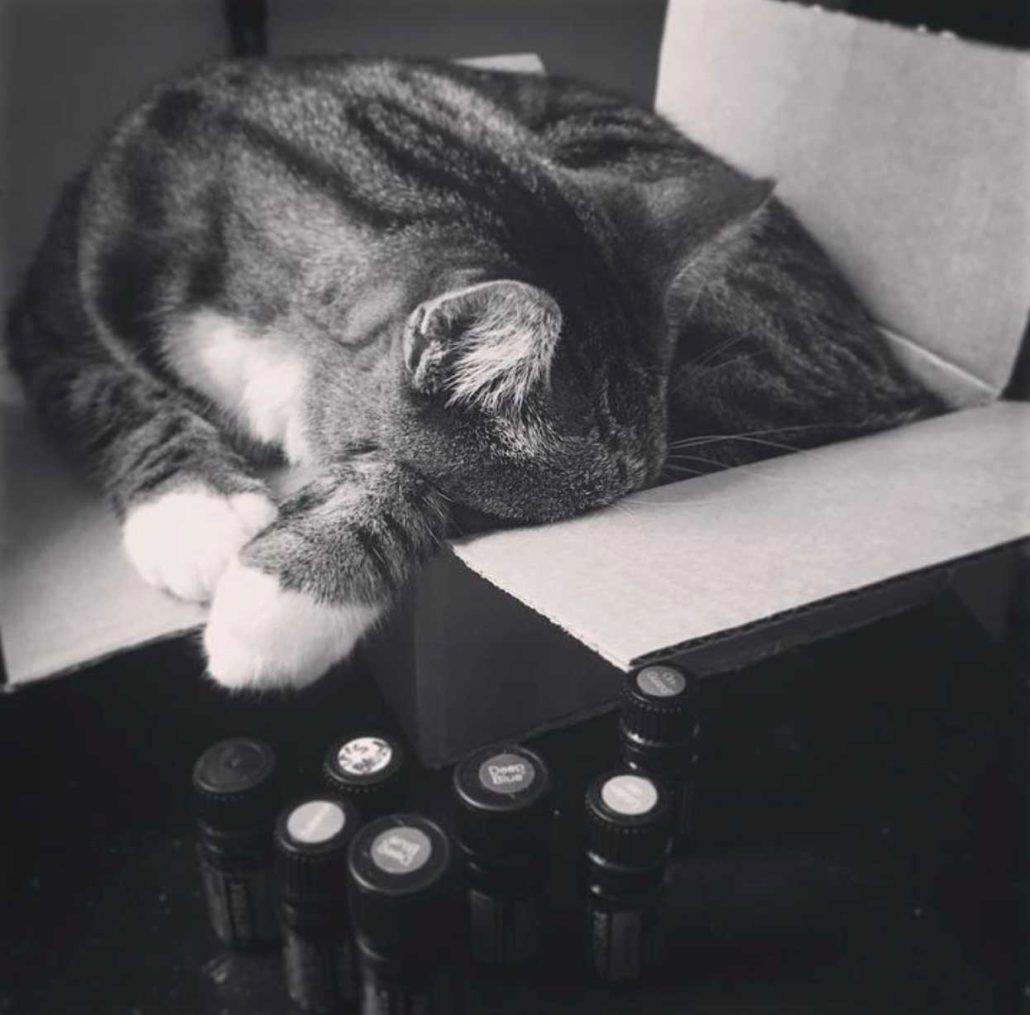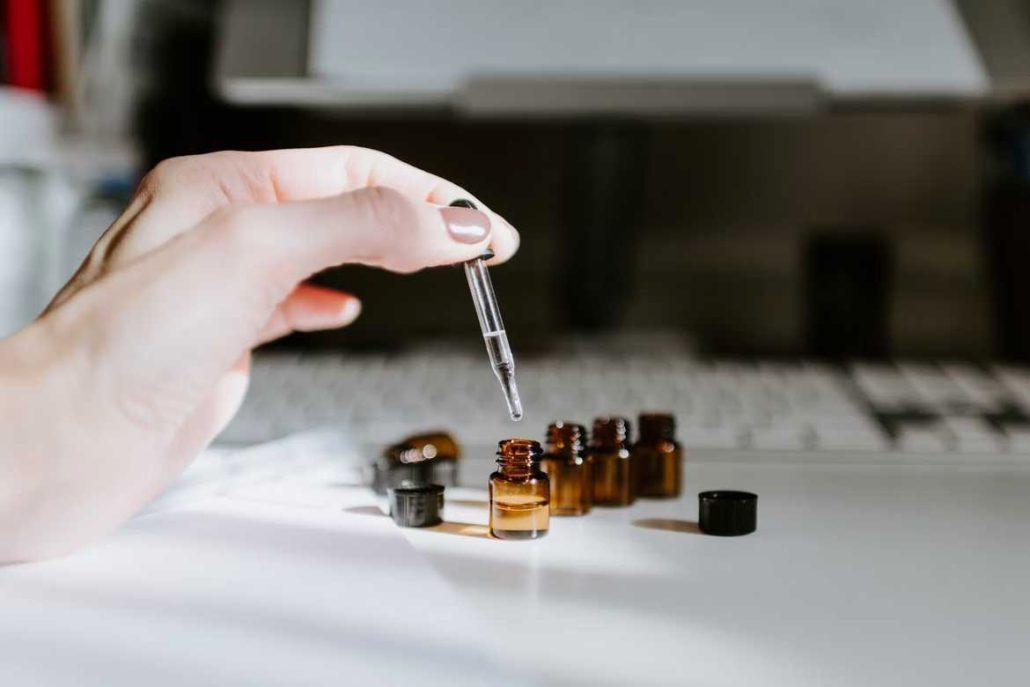- Jake Peter
- Published: August 5, 2022
- Fact-checked by Dr. Desiree Granados

The concept of aromatherapy, also called essential oil therapy, has been around for a long time. This practice involves using plant extracts to improve humans’ health and general well-being. Some cat owners have chosen to take advantage of this innate ability by advocating the use of aromatherapy to treat cat-related conditions. But is aromatherapy for cats ideal?
Most essential oils used by humans for aromatherapy are unsafe for cats. The reason is that they contain toxic compounds that could negatively affect cats’ health, especially concentrated essential oils. Besides, cats have softer skins permeable for essential oils to penetrate. They may also lick up the oils when applied to their skins. Since cats do not have the enzyme necessary to break down these oils, this could lead to failure in their central nervous system or cause liver damage.
However, are there essential oils safe for cats? What oils are unsafe for cats? Keep reading as we provide answers to these questions and other important things about using aromatherapy for cats.
Does Aromatherapy Work on Cats?
Aromatherapy works on cats, but this requires extreme caution. The reason is that most essential oils used for this therapy are poisonous to cats. Hence, always avoid applying essential oils to the cat’s skin and nose.
Please note that cats have thin skin, which facilitates the fast absorption of these toxic oils. Also, since some contain polyphenolic compounds, which can be toxic, they could negatively impact the cat’s health.
As pet parents, if you want to use aromatherapy on cats, avoid using the concentrated forms of essential oils.
What Essential Oils Deter Cats from Peeing?

Some essential oils that are non-lethal and seemingly safe to use have side effects, one of which involves deterring your cats from peeing. They don’t directly affect the excretory system of cats but create a sensation that makes the cat not want to pee at the spots where they are applied. They must be applied frequently, especially when you have an area where you don’t want your cat peeing. Below are some essential oils that can deter cat from peeing.
- Lavender Oil: The Lavender plant has a strong smell, but it is one of the safe essential oils to diffuse around cats due to its calming and anxiety-reduction properties. Using this oil within the cat’s litter box would calm the cat, increasing the propensity to pee within the litter box instead of elsewhere in the home.
- Peppermint Essential Oil: The peppermint oil derived from peppermint is quite popular due to its cool and refreshing smell. However, cats hate the smell of peppermint. They try to avoid contact with areas with this smell at all costs. To prevent cats from peeing in areas around the house other than their litter, spray peppermint oil on those areas.
- Eucalyptus Essential Oil: This oil has a sharp and minty smell. Humans often use this oil because of its ability to clear the head and open up the sinuses. However, cats do not like the smell of eucalyptus oil because of its offensive odor. Using Eucalyptus oil on sitting room chairs and other areas around the house helps deter cats from peeing on them.
- Citrus: Cats do not like the smell of citruses because they contain phenolic compounds that they find highly sensitive. This makes citrus natural cat repellants, meaning they would not pee in areas of the house where citrus oils are sprayed.
Is Aromatherapy Safe for Cats?

While aromatherapy works wonders in humans, it is not advisable to practice this therapy on cats because not all essential oils are safe to use around them. However, if you choose to use them, apply the oils with great caution after talking to your Vet.
Are Essential Oils Toxic to Cats?
There are a lot of reasons to avoid aromatherapy with cats. Firstly, most essential oils are animal poison when ingested by cats. You should never apply these oils to a cat’s body since they tend to lick it. It also means storing essential oils safely beyond the reach of your cat.
Pure essential oil, when ingested, could cost you to visit the Vet because of respiratory distress or major health challenges it causes to pets.
Secondly, applying oils using sprays or active essential oil diffusers releases these oils in small amounts. Irrespective of the diffuser type, the cat’s fur traps and accumulates this oil’s molecules. Since the cat has thin skin, it quickly absorbs these accumulated oils through its skin.
This makes the cat’s liver functions hard to break down the toxins in this oil absorbed through the skin. However, the liver could be unable to do this since it does not contain the enzyme necessary for this breakdown, leading to liver damage or failure in the central nervous system.
Thirdly, a cat has a highly sensitive smell. Hence, the smell of essential oils can easily overwhelm them. These oils can wreak havoc on their respiratory system while impacting their health negatively. It often leads to a watery nose or eyes. To reduce the toxicity of essential oils, ensure to use diffusers in dispensing them instead of concentrates. However, ensure to use essential oil diffusers in an open space and keep the cat away from them.
There are obvious signs if a cat ingests toxic essential oil. Below are symptoms to look out for.
- Change of color around and in mouth region; mostly redness
- Difficulty breathing
- Fatigue
- Agitation
- Pawing at facial features
- Muscle tremors and difficulty walking
- Watery eyes or nose
- The smell of oil on a cat’s fur
If you notice any of these symptoms as pet parents, the ideal thing to do would be to call the vet or animal poison control and seek medical help immediately. The faster you get medical help, the higher the cat’s chances of recovering quickly.
What Essential Oils Are Bad for Cats?
There are a lot of pure essential oil blends proven toxic for cats. These oils trigger a negative reaction in cats and could impact their health negatively. Below are oils to avoid when considering aromatherapy for cats.
- Cinnamon
- Clove
- Pine
- Geranium
- Tea tree oil
- Thyme
- Wintergreen
- Ylang Ylang
- Peppermint
- Citrus
- Sweet Birch
Other essential oils aside from these are harmful to cats. Chief among them are paint thinners and insect repellants. These products contain essential oils that cats react fatally to.
What Aromatherapy Oils are safe for Cats?

A few essential oils are good for cats and are safe to use around them. They include; Chamomile oil, lavender oil, lemongrass oil, and rose oil. Olive oil is also an essential oil good for cats, which can act as a carrier oil, making them more playful and active.
It is important to note that these oils, in their concentrated forms, are still toxic to cats. So, to use them, ensure to reduce their phenol content by diluting them. But before using any oil on a cat, consult the Vet.
Are Scented Candles Bad for Cats?
Most scented candles do not bother cats, especially when used in areas with proper ventilation for short periods. However, there are risks associated with using a scented candle for cat aromatherapy. Below are some of these risks.
- Risk of Getting burnt: Candles produce flames which can be dangerous. When candles are left unattended, the cat is also a burn risk. Hence, when using a scented candle, ensure to keep them away from far from the reach of cats to avoid it getting knocked over.
- Type of Essential oil in the candle: Some cats have allergic reactions to some plants, which means they would have the same reaction on exposure to the essential oil of that plant regardless of its form. Avoid using scented candles that contain plant extracts that cats consider toxic.
- Chewing the candle: Cats often bite and chew objects out of curiosity, which would likely happen to the scented candle. Hence, when using a scented candle, keep it out of the reach of your feline friend. However, if you discover your cat has eaten scented candles, contact the animal poison control center.
What Essential Oils Attract Cats?

There are a few essential oils that attract cats and are safe to use around them. They include:
- Catnip: The essential oil produced from this plant stimulates the mind of cats, putting them in a playful mood.
- Olive: Cats tend to go close to the smell of this essential oil. Like catnip, the smell of Olive oil makes cats more playful and active.
- Honeysuckle: This is one of the calming essential oils for cats. Its smell helps cats relax.
- Thyme: This has a pleasant smell, attracting cats. Unlike most essential oils, thyme helps cats relax naturally. It also possesses beneficial soothing and anti-inflammatory properties.
Please note that being safe to use around them does not include allowing cats to ingest these oils. Also, consult the Vet before using any oil on cats.
Bottom Line
Aromatherapy for cats is risky because of the complications that could arise. In other words, essential oil and cats are like oil and water, and they do not mix well. So, avoid applying the essential oils directly to cat’s fur and facial features when practicing this therapy because its body could easily assimilate the toxins in the oil, leading to liver damage.
If you must use aromatherapy or apply essential oils, consider using a diffuser with the right precautions. Also, use diluted forms of essential oil. But before you consider using this therapy on your cat, ensure to inform your Vet first.
How we reviewed this article:
- National Library of Medicine
https://www.ncbi.nlm.nih.gov/pmc/articles/PMC7712454/
Current Version
August 5, 2022
Written By
Jake Peter
Fact-checked By
Dr. Desiree Granados
Editorial Process
Our Editorial Process

Jake Peter received his journalism degree from Emerson College and has been writing content for the Sanctuary Wellness Institute since 2021. He is passionate about all things cannabis.







